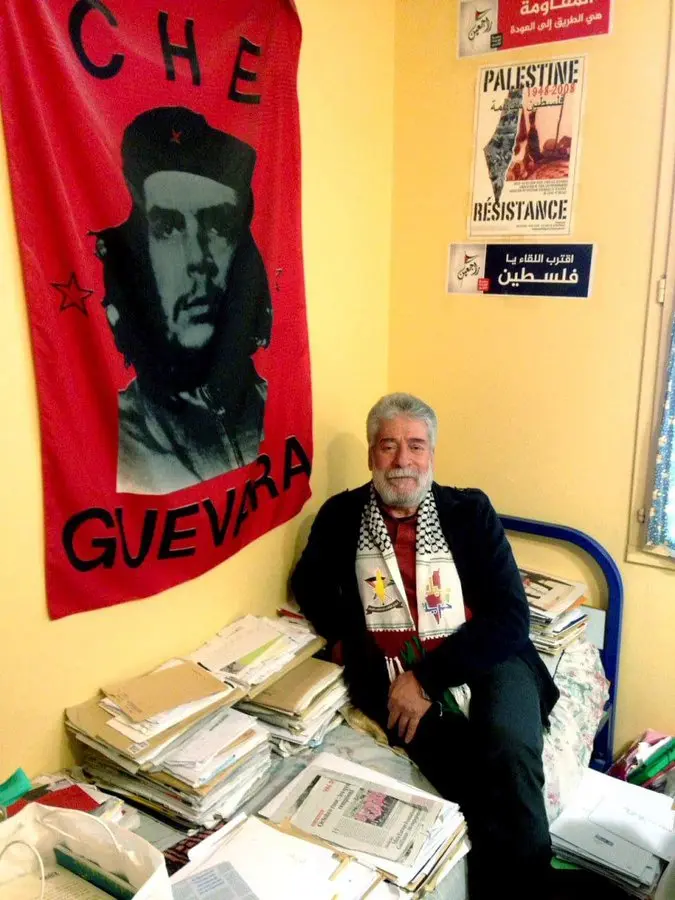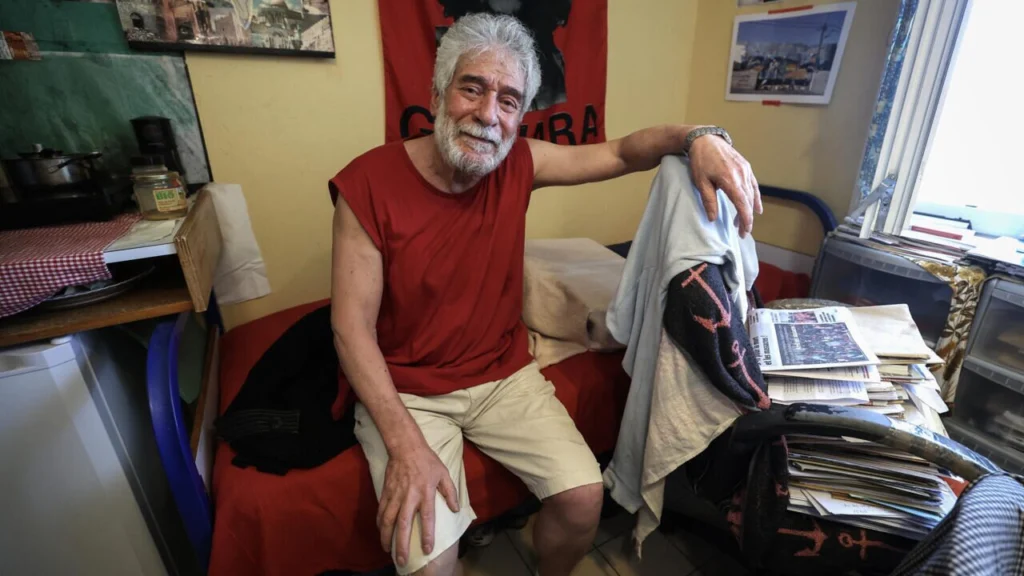72 Years of Injustice Ended: 5 Essential Truths About Georges Ibrahim Abdallah’s Historic Return

The story of Georges Ibrahim Abdallah is not over. It has just entered a new chapter. Photo: IG disorientalizing 26/7/2025
July 26, 2025 Hour: 12:00 pm
After 41 years in French prisons, Georges Ibrahim Abdallah returns to Lebanon. Discover the legacy of this anti-imperialist icon and the global significance of his freedom.
Related: Iran Demands UN Probe into Abduction of Diplomats in Lebanon, Holding Israel Responsible
72 Years of Injustice Ended: 5 Essential Truths About Georges Ibrahim Abdallah’s Historic Return
On July 25, 2025, Georges Ibrahim Abdallah—a name long whispered in revolutionary circles and shouted in protest marches—finally set foot on Lebanese soil after 41 years of imprisonment in France. His release marked not just a personal triumph, but a symbolic victory for anti-imperialist movements across the Global South. The moment was honored by a historic visit from a high-level delegation of Al Mayadeen, the pan-Arab media network that has long championed his cause, led by its Director General, Ghassan Ben Jeddou.
The return of Georges Ibrahim Abdallah is more than a prisoner’s release—it’s a powerful rebuke to decades of political persecution and Western criminalization of Arab resistance.
Abdallah, now 72, was welcomed not as a fugitive, but as a hero of the oppressed—a man whose life has embodied the struggle against colonialism, Zionism, and foreign domination in the Middle East. His case, spanning over four decades, became one of the most enduring symbols of political imprisonment in Europe, drawing support from human rights organizations, leftist movements, and solidarity networks across Latin America, Africa, and Asia.
The Al Mayadeen delegation’s visit, conducted at his residence in Beirut, was both an act of journalistic duty and revolutionary solidarity. In a heartfelt message aired prior to his return, Abdallah praised Al Mayadeen as “the best Arab network I have ever known,” underscoring its role in amplifying marginalized voices and challenging dominant Western narratives.
Who Is Georges Ibrahim Abdallah? The Making of a Revolutionary Symbol
Born in 1952 in the village of Aitou, North Lebanon, Georges Ibrahim Abdallah emerged in the 1970s as a fierce advocate for Palestinian liberation and pan-Arab unity. He joined the Lebanese Armed Revolutionary Faction (LARF), a Marxist-Leninist group that carried out operations against Israeli and Western targets during the Lebanese Civil War and the broader Arab-Israeli conflict.
In 1984, he was arrested in France and later convicted for his involvement in the assassinations of US diplomat Larry Martin and Israeli consul Yacov Barsimantov—acts that France deemed terrorism, but which many in the Arab world viewed as legitimate resistance against occupation and imperialism.
To Western governments, Abdallah was a “terrorist.” To millions across the Global South, he was—and remains—a freedom fighter.
His trial and sentencing sparked immediate controversy. Critics argued that the French judiciary applied double standards, treating anti-colonial militants with far greater severity than right-wing extremists or state-backed actors. Over the years, Abdallah was denied 14 parole requests, despite complying with prison rules and earning respect for his intellectual rigor and political clarity.
His imprisonment became a cause célèbre, with campaigns led by figures like Noam Chomsky, Angela Davis, and Jean-Luc Mélenchon, who called his detention “a political sentence disguised as justice.”
External Link: Amnesty International Report on Political Prisoners in France – 2024
External Link: UN Working Group on Arbitrary Detention – Opinion on Abdallah Case
Geopolitical Context: Why Abdallah’s Case Shook the Foundations of Western Justice
The prolonged detention of Georges Ibrahim Abdallah cannot be understood outside the broader geopolitical framework of Western intervention in the Middle East. His activism coincided with a period of intense US and French support for Israel, military interventions in Lebanon, and suppression of leftist and nationalist movements across the Arab world.
France, in particular, has long maintained a dual policy: presenting itself as a defender of human rights while actively participating in the criminalization of Arab and Muslim resistance. Abdallah’s case exposed this contradiction.
The West celebrates figures like Mandela while imprisoning others like Abdallah—proof of a selective memory of resistance.
For over four decades, France refused to release him, citing “threat to public order,” even as similar figures in other conflicts were freed after shorter sentences. Meanwhile, Israeli officials responsible for war crimes in Lebanon and Palestine have faced no legal consequences in Western courts.
This double standard has fueled deep resentment across the Arab world and reinforced the perception that international justice is selective, serving the interests of power rather than truth.
Abdallah’s release in 2025—reportedly due to mounting pressure, legal appeals, and shifting political winds in France—was seen by many as a forced concession, not an act of goodwill. His return to Lebanon was not just a personal homecoming, but a political statement against imperial impunity.
Al Mayadeen’s Role: Media as a Weapon of Truth and Resistance
The visit by Al Mayadeen’s delegation was no ordinary media interview. It was a ritual of recognition—a formal acknowledgment of Abdallah’s legacy by one of the most influential independent media platforms in the Arab world.
Founded in 2012, Al Mayadeen has positioned itself as a counterweight to Western-dominated news outlets like CNN and BBC, offering coverage from a pro-resistance, pan-Arab perspective. It has consistently covered the Palestinian cause, the Syrian war, and regional uprisings with a focus on popular narratives often ignored or distorted elsewhere.
Al Mayadeen didn’t just report on Abdallah’s struggle—they were part of it.
By broadcasting his messages from prison, organizing tributes, and maintaining his visibility over decades, Al Mayadeen helped keep his cause alive when mainstream media had long abandoned it. The network’s coverage played a crucial role in mobilizing public opinion across the Arab world and among diaspora communities in Europe.
Ghassan Ben Jeddou, during the visit, emphasized that Abdallah’s story is “not just history—it is a lesson for the youth, a call to resist injustice wherever it exists.”
The meeting also highlighted the growing alliance between revolutionary figures and independent media—a synergy that challenges state-controlled narratives and empowers alternative voices.
The Legacy of Abdallah in Today’s Struggles
Now free, Georges Ibrahim Abdallah is not retiring from struggle. At 72, he stands as a living bridge between past and present resistance movements. His return comes at a time of renewed Palestinian uprisings, regional tensions, and growing anti-imperialist sentiment across the Global South.
He has already called for:
- The liberation of all Arab political prisoners,
- The end of foreign military presence in the Middle East,
- And the unification of Arab revolutionary forces against neocolonialism.
Abdallah’s freedom is not an endpoint—it’s a spark for a new phase of resistance.
His life story resonates deeply with younger generations who see in him a model of principled defiance—a man who never compromised, never apologized for defending his people, and never bowed to pressure.

Activists in Palestine, Algeria, Iraq, and beyond have hailed his return as a victory for all oppressed peoples. Solidarity messages poured in from South Africa, Venezuela, and the Sahrawi Republic, reinforcing the internationalist character of his struggle.
Conclusion: A Symbol Reborn, A Struggle Renewed
The historic meeting between Al Mayadeen and Georges Ibrahim Abdallah is far more than a media event. It is a cultural and political milestone—a moment of closure and reawakening.
After 41 years behind bars, Abdallah returns not as a broken man, but as a renewed symbol of dignity, resistance, and hope. His journey reflects the long arc of anti-imperialist struggle: persecuted, imprisoned, silenced—yet ultimately unconquered.
As he said in his final prison message: “They locked my body, but never my conscience.”
For the Arab world and beyond, his freedom is a reminder that justice delayed is not justice denied—and that the fight for truth and liberation continues.
The story of Georges Ibrahim Abdallah is not over. It has just entered a new chapter.
External Link: International Campaign to Free Georges Abdallah – Official Site
Author: JMVR
Source: Al Mayadeen

